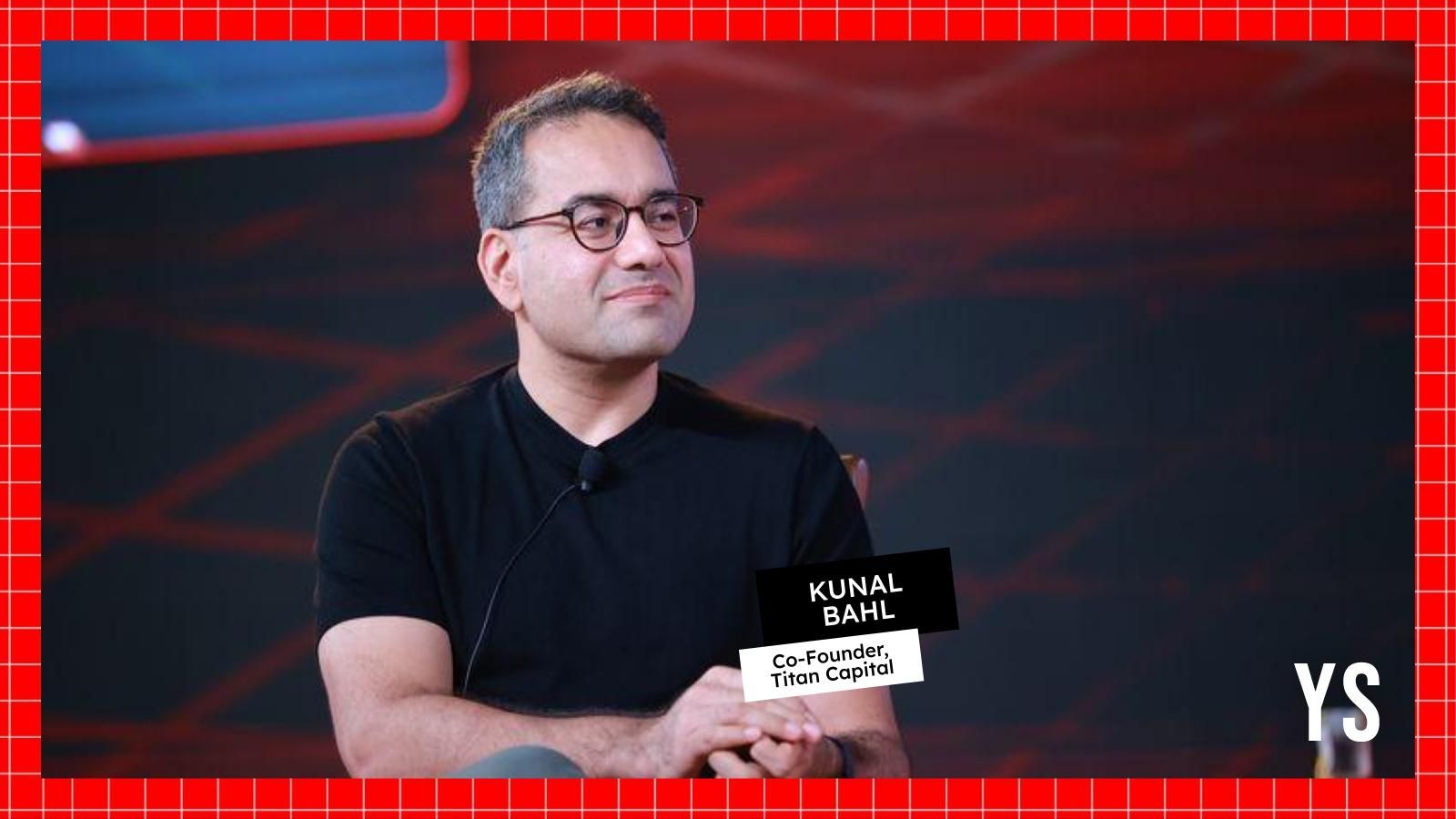Titan Capital, founded by Snapdeal’s Kunal Bahl and Rohit Bansal, has traditionally invested in startups at the seed or Series A stages. Now, with its latest fund, the venture capital (VC) firm wants to exclusively invest in follow-on rounds of some of the top-performing companies from its portfolio of 280 startups. Moreover, for Tital Capital, the additional capital will serve as a mark of confidence in its portfolio.
On Monday, the early-stage investment fund, which has invested in companies like Bhavish Aggarwal’s Ola Consumer (back when it was Ola Cabs) and Mamaearth, made the final close of its new fund at Rs 333 crore. The VC firm is looking to invest in 20 startups with an average ticket size of Rs 15 crore.
Titan Capital has historically never relied on external capital and the Winners Fund marks the first time the firm has opened its doors to limited partners (LPs) to invest in its fund.
YourStory spoke with co-founder Bahl to understand the strategy behind the new fund and how he hopes to reiterate the firm’s commitment to its portfolio companies amidst a growing trend of venture funds moving away from tech-enabled companies.
Edited excerpts:
YS: Could you elaborate more about your strategy with the Winners Fund?
Kunal Bahl: Over the past 13 years, Rohit Bansal and I have been actively investing our capital in around 280 companies—a journey that has proven fruitful. We have had the privilege of supporting numerous exceptional founders and their ventures, continuing this support through our Titan Seed Fund wherein we are still investing our own proprietary capital. This ongoing commitment reflects our belief in the potential of these startups and our dedication to fostering their growth.
As time progressed, we observed two significant trends.
First, the founders in our portfolio expressed their appreciation for our early belief in their vision, encouraging us to increase our investments in subsequent funding rounds. This feedback highlighted the strength of our relationships and the trust we had built. Simultaneously, many individuals within the ecosystem—fellow founders and those with sizable family offices—began reaching out to express interest in co-investing alongside us, recognising our strong deal flow and a keen eye for promising companies.
To address the challenges of coordinating these investments while respecting the founders’ preferences, we conceived the Winners Fund. This capital amplification vehicle allows us to anchor the fund as its largest investors, collaborating with like-minded individuals to invest in the standout companies within the Titan Seed Fund portfolio that we already know well, making it an ideal opportunity for us to double down on our best prospects.
YS: Can you give us a sense of who the LPs are for the Winners Fund?
Kunal Bahl: It’s mainly many large, reputed family offices, CEOs of large listed companies, and many founders as well from the startup ecosystem who have scaled good businesses. So it’s a combination.
YS: Is the capital being raised domestically?
Kunal Bahl: It is predominantly domestic capital. I feel very passionately about activating domestic capital.
The recent data reveals that only 15% of startup funding in India last year came from domestic sources. This situation needs to change, as a strong foundation of domestic capital is essential for a stable startup economy. Without it, we risk being overly influenced by the fluctuations of global financing markets, which can create uncertainty for local businesses.
As seasoned investors with extensive experience and a portfolio of companies, we have gained valuable insights and established various investment vehicles. This expertise not only bolsters our confidence but also serves as encouragement for others interested in investing in the domestic financial markets and startup ecosystem but lack credible avenues to do so. It is crucial to activate and mobilise more domestic capital in India to support startups, ensuring a robust and resilient financial landscape for emerging enterprises.
YS: Do you see the trend of mobilising more domestic capital growing?
Kunal Bahl: It is only a matter of time. It is already increasing but I would love for it to increase more. I feel that 85% of the capital dependency continues to be on foreign capital. That cannot be great. It subjects the startup ecosystem’s fate to hang in the balance of global financial markets, even if India is a macro bright spot.
So, I hope and wish that other good investors also give an opportunity to domestic capital to participate in the startup economy.
YS: What is your thesis in identifying the right companies to invest in?
Kunal Bahl: We categorise our investment approach into three key buckets.
First, we prioritise great founding teams that have demonstrated success in various fields, whether it’s dance, music, art, academics, or previous business ventures. A strong track record indicates the potential for future achievements, which is crucial in the startup landscape.
Secondly, we focus on interesting market spaces, specifically companies targeting what I call ‘laughably small TAM (Total Addressable Market)’. These are niche areas where businesses can utilise limited resources to establish dominance, earn consumer trust, and subsequently expand into broader categories.
The third bucket emphasises the importance of generating solid unit economics, as they represent the core of any business. If the unit economics aren’t properly established in the early stages, it becomes challenging to rectify them later without fundamentally altering the business. Additionally, we maintain a principle of investing only in sectors we understand deeply, primarily focusing on tech-enabled businesses in areas such as marketplaces, logistics, SaaS, fintech, and new-age consumer brands where we have considerable experience.
YS: Titan Capital has backed tech-enabled companies and understands these business models well. However, there has been a recent outcry about there being no money for growth-stage companies in India. Is that something you would want to focus on going forward?
Kunal Bahl: We are not visionary people. We can’t think of the future. There’s a saying that goes: you start with the necessary, then you move to what’s possible, and then before you know it, you’re doing the impossible. So, we first just start with the necessary.
We just felt that this was for us and for the founders of the Titan family. The founders were coming and telling us themselves that, ‘look, when we go out to raise money, what would be great for us is we get an external investor to price the round, to lead the round, and you fill-up the rest of the round.’
We don’t have to do too much brain damage running around trying to find investors to fill the round. It just felt like a very organic pull, like something that seemed necessary for our founders.
Right now there’s no other, like, long-term plan of setting up a growth capital vehicle.
YS: Will Titan Capital also look beyond tech-enabled sectors like most VCs today?
Kunal Bahl: No, actually we just look to invest in companies which are in our circle of competence. It does not mean that if we don’t understand it, it’s not a good company to invest in. Maybe someone else understands it better than we do.
So, our view is that we don’t need to be in all the good companies as investors. We just need to make sure the companies we’ve invested in are good. That’s it. Because if you keep investing in companies that are good, you will generate good returns which you can then reinvest to back the next cohort of sectors.
So, we don’t feel any fear of missing out on hot spaces. We don’t really invest in waves and spaces. While the macros are important, we mostly invest in the micros.
YS: By when does Tital Capital expect to disperse the entire fund?
Kunal Bahl: There is no strict timeline as such but roughly around 2-3 years. It depends on if more companies mature faster, we will invest faster. If it takes longer, we will take longer to invest. But we have no such pressure to invest quickly or desire to invest very slowly either. We will do it on an organic basis.
YS: The firm said there are 2-3 deals in the pipeline as part of your Winners Fund that are in the final stages. Could you hint at what sectors these companies are in?
Kunal Bahl: There is one company in the business-to-business (B2B) space. There is another in the construction material space and another in the quick service restaurant (QSR) space.










